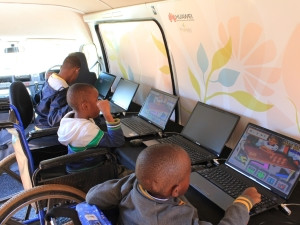
Huawei SA has partnered with Khulisani Enterprise to provide a mobile information and communications technology (ICT) training centre for psychologically and physically impaired children in the south of Johannesburg.
The unveiling of the mobile centre, housed in a mini-bus, took place at the Thabovuyo School in Sebokeng, Johannesburg and aims to provide foundational computer literacy, basic desktop and MS Office Suite training and Internet access.
"Huawei decided to chip in on this initiative to assist disabled learners with ICT skills as we felt they are largely marginalised due to their condition. We also wanted to create a platform where the disabled learner is employable which is difficult for most without ICT skills, we hope this initiative is the first of many to come," said Liu Wenjun, CEO, Huawei SA.
Speaking at the event, national operations manager at Khulisani, Racheal Erskine, said the partnership with Huawei would vastly improve the ICT skills of both the teachers and learners.
"We saw there was a need for the mobile project and thankfully Huawei was there to assist us. We also noticed that the most of the teachers were not computer literate so this will be a chance for them to learn as well with the learners," she said. "We're thinking of starting with the basic stuff like e-mails and the like just to get them communicating with each other so they can understand the process and then onto basic ICT skills."
According to Erskine, the project aims to educate learners so that they can improve their future employment prospects; as many disabled children struggle to find work after finishing school.
"We've used Big Boet software on the computers which assesses the different levels and phases of learning for each child as they have different needs and understand things differently, we're seen real improvement to those children who've come to Thabovuyo School and other schools in the area and we're hoping to add to that," added Erskine.
The mobile centre will spend one day in each school, with groups structured according to age, ensuring all the children get the opportunity to use the machines, says Erskine.
"Considering that there's a lot of children that need to use the equipment and it will be around different schools at the different times, we've ensure that the center will be regularly checked and we have a time schedule where we know where it will be, for which children and times," she added. Speaking of the quality and management of the equipment, Erskine mentioned that the machines would be well looked after.
"We believe the driver and trainer are capable of ensuring the safety and maintenance of the machines and the computers will be stored in a 24 hour safe when not in use," she added.
"We conducted research into their needs and customised the training accordingly, in order to accommodate the different disabilities which the pupils experience, ensuring a positive outcome for the project."
The five special needs schools that will benefit from the project include JNS school for children with Cerebral palsy, Eureka School for the mentally disabled, Handhawer School, Sebokeng Technical High school and Thabovuyo School.
The mobile centre will be active in Meyerton, Vereeniging, Vanderbijlpark, Sasolburg and the surrounding low income residential areas and informal settlements in the south of Johannesburg.
Share